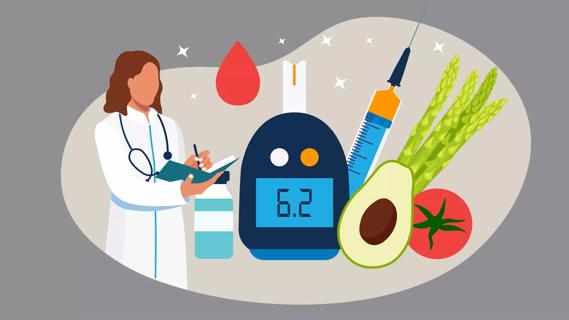You can counter the risk of prediabetes-related heart attack or stroke by eating more fruits, vegetables and whole grains, as well as exercising regularly

If your doctor says you have prediabetes, it means your blood sugar is high but not quite to the level of diabetes. You may feel like you’re in the clear for now, but the truth is, you’re already at higher risk for heart attack and stroke with prediabetes blood sugar levels.
Advertisement
Cleveland Clinic is a non-profit academic medical center. Advertising on our site helps support our mission. We do not endorse non-Cleveland Clinic products or services. Policy
It’s pretty well known that high blood sugar can have an impact on your kidneys and blood vessels. So, now is the best time to take steps to address those risks and protect your heart.
Cardiologist Monica Khot, MD, says the link between prediabetes and heart disease comes from elevated blood sugar levels, which can cause inflammation and damage blood vessels.
So, what can you do? Dr. Khot explains what you need to consider when it comes to protecting your heart when your blood sugar is even a little high.
A diagnosis of prediabetes typically means your blood sugar levels are:
Dr. Khot calls these levels “a yellow light warning signal.” If they get any higher, you’re in the range for diabetes.
Although you may not have diabetes, being on the border can set off unhealthy changes in your body.
Prediabetes is one part of metabolic syndrome, which increases your risk of blood clots and damage to coronary arteries. This may lead to heart disease and stroke.
A 2020 meta-analysis, which looked at the records of more than 10 million people, found that those with prediabetes had a 15% increased risk of cardiovascular disease. Those with diabetes also carry a higher risk of coronary artery disease and stroke.
Advertisement
Even those with A1C levels just below prediabetes were more likely to have the first two conditions.
If you have prediabetes, there are many things you can do to protect your heart.
“First, you have to get your other basic risk factors for heart disease under control,” Dr. Khot says, including:
Dr. Khot recommends eating foods that have a low glycemic index to avoid increasing blood sugar levels further.
The glycemic index tells you how quickly foods with carbohydrates will raise blood sugar. The lower the food is on the scale, the better.
“For instance, eating an orange is better than drinking juice because the body has to do more work to get to the sugar, and the sugars are then distributed more evenly,” Dr. Khot illustrates. “If you watch your sugars, your numbers will start to go down from the yellow light to the green light.”
Exercise is also a great way to reduce your risk of heart disease. If your weight is normal, Dr. Khot recommends walking 30 minutes a day, five to six days a week. If you need to lose weight, try to get in an hour of walking about six days each week.
“Data show you really need to walk more than 30 minutes a day to start losing weight,” she adds.
Prediabetes often comes on without any symptoms. But it’s important to know early if your blood sugar levels are creeping up so you can take steps to avoid moving into diabetes — and protect your heart and blood vessels.
Seeing a healthcare provider for a yearly physical is the best way to keep an eye on your blood sugar levels over time. Or if you have concerns about prediabetes, make an appointment for a blood sugar test now.
Advertisement
Learn more about our editorial process.
Advertisement

Hot, humid weather can affect your blood sugar levels and even cause dehydration or heat stroke

The good news? Prediabetes can be erased with healthy lifestyle changes, including eating more nutritious foods

Fresh or frozen fruits that are low on the glycemic index should be your go-to, as they’re full of fiber and other nutrients

Adding nuts like pistachios, almonds or pecans to your diet can help manage blood sugar levels

A diabetes diagnosis, new or long-standing, can trigger reactions like grief, stress, depression and frustration, but symptom relief and help are available

The short answer: Yes, but you need to eat it in moderation and keep track of how much you consume

Sweet potatoes are great, but sweetened drinks aren’t so great

Some sweeteners may have health risks, so it’s best to keep your intake moderate

You can improve your athletic performance over time by breaking up your workout regimen into focused cycles

The little blue pill might help with physical arousal, but there are better treatments for low libido in women

Sleep issues and certain foods can lead to an early morning headache